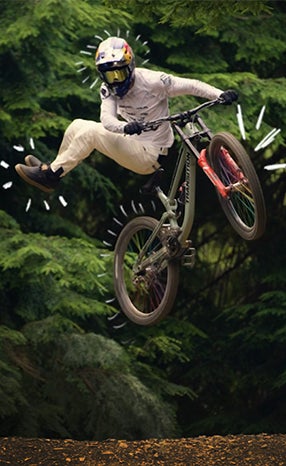There isn’t much left of the world unexplored, Google Maps pretty much has us covered to a certain extent. Although Jenny Graham would argue it’s not to the nth degree. Exploration nowadays is as much about exploring new places as it is yourself; seeing what mettle you are made of and exploring where your limits are. Graham’s recent expedition set her upon a personal quest to breakthrough physical limits as well as a world record. This year after 124 days on the road, Jenny Graham cycled over 18,000 miles around the world, unsupported. She broke down her own mental and physical limiters as well as the previous world record by 20 days.
As a Scottish Highlander her default is the outdoors and guzzling as much fresh air as possible, the bike is her means to ensure this happens. So after completing Land Ends to John O'Groats in 96 hours was it a natural progression to cycle around the world?
“I guess just being really curious as to whether I could do it or not, I only started riding a road bike 5 years ago. And each year I was doing things and finding that I'm really good at endurance, that's where my strengths lie and so I started looking at endurance events,” Graham explains.
One of the first mental barriers to break through is to actually admit to yourself and others that you’re going to attempt such a feat.
One of the first mental barriers to break through is to actually admit to yourself and others that you’re going to attempt such a feat. Mulling it over in your head can allow romanticism to set in, you fall in love more with the idea of undertaking the endeavour, rather than actually doing it. It’s when you start to publicise it that it verbally cements the deal.
There were few people Graham let in on the secret for a start, her 20-year-old son, Lachlan responded with: "Well of course you are!" when she told him she wanted to cycle around the world. Her coach, John Hampshire, who was working with her as an experiment was clearly delighted at her proclamation, "What a fantastic idea, I will definitely work with you on that," was his response.
Filmmakers Mike Webster and Tom Hogben were equally as pleased when Graham mentioned the plan. As was Lee Craigie of The Adventure Syndicate, the cycling ambassador lead site that encourages women to take up cycling. Within a few months there was suddenly a handful of people rooting for her to make it to the startline.
“It's a miracle I didn't have a breakdown on the startline, honestly, it was crazy,” Graham says, head in hands, the bubbling giddiness momentarily replaced with the weight of disappointment. “I was just about to go to bed and Tom and Mike were there. It was midnight, then all of a sudden I realised that I hadn't downloaded my routes onto my Garmin. I was meant to be setting off at 6am the next day. I was thinking, ‘I can't even find my way out of Berlin.
Ah, mate you can't even do the simple stuff how are you going to do cycle round the world?
“At first I couldn't get my Garmin working. It took two hours and I ended up with half of the world downloaded, I had until New Zealand to get it sorted. I went off to bed at 2am feeling like the biggest loser in the world,” she says.
Graham explains that in the run-up to the start she was not only exhausted from the 20 hours of training a week she was trying to fit around her job, but that being away for over three months takes a lot of time to plan too. As well as getting sponsors on board and funding for her trip.
As she rolled towards that imaginary startline in Berlin the previous night’s Garmin escapade was a heavy burden on her mindset, “I'm not joking, it just totally took it out of me, I was like, ‘Ah, mate you can't even do the simple stuff how are you going to do cycle round the world?’"
Graham’s thick Scottish accent accentuates every emotion that comes out of her. It clearly has the ability to get anyone on board with any type of crazy idea. You imagine that voice, so full of energy, has been her companion that has talked sense into herself numerous times over those 124 days.
The world record has stipulations, rules and requirements that have to be met. It doesn’t specify that you must circumnavigate from east to west or vice versa, that choice is yours, but you have to be going in one direction for a certain amount of time. A minimum distance of 18,000 miles has to be covered over land and the whole journey has to be the circumference of the planet, all 24,900 miles of it. You have to travel through two anti-polar points – Graham chose Spain and New Zealand. You are not allowed to go back on yourself. Neither are you allowed to cross the same longitude line twice.
“There was a bit in Beijing where you had to make sure you finished in line with Perth even though they are miles apart. But because that’s where I was flying to next it was so I didn’t cross the same longitude line twice.”
Although our planet has 7.5 billion people inhabiting it, there's still millions of acres of it where you barely see a single soul.
Not being the first one to travel around the Earth by bike Graham used this to her advantage and discussed routes with Mark Beaumont, the current men’s world record holder. But this was helpful only up to a certain point. Beaumont’s circumnavigation was fully supported, whereas Graham’s wasn’t. Travelling over vast uninhabited expanses of land, the likes that Russia, Australia and Canada are made up of, meant longer diversions for Graham towards humanity, where regular supplies could be sourced.
Although our planet has 7.5 billion people inhabiting it, there’s still millions of acres of it where you barely see a single soul. Solitude can be a place of cogitation for some, for others a catalyst towards insanity. Travelling into China through the Gobi desert Graham found she could travel for hours upon end without there being a trace of a single human being.
But there was still this underlying feeling that she was never alone, “Men would just come walking out of random fields, and you thought to yourself, ‘Where have you been?’ I got a puncture one day and then this guy just all of a sudden appeared at my side wanting to help me. I was completely in the middle of nowhere all alone for miles and miles and just there he was. I get the impression that you're never really alone there.
“But everyone there was so incredibly friendly, if you went to find food someone would come and sit beside you, and then before you know it all their friends would come and sit beside you. I've got lovely footage of people outside of shops helping me pack up and filling my pockets with water and food and them cheering me on and waving into the camera”.
One overarching emotion from Graham is her gratitude for the generosity of people she met along the way. Hearing her explain the many occasions of strangers going out their way to ensure she was able to continue, is the perfect anti-venom to a world that appears to be hating each other, “Local bike shops on the way round, every single one of them went way above and beyond what you would ever expect. One guy actually opened up his shop which was closed and then did a massive amount of work on my bike. He stripped down one of the mechanic's bikes so he could give me the spare parts he didn't have. Then he put me up in one of his motels so I could sleep whilst he did the work.
“Another guy in Australia was trying to lend me his car so I could go buy batteries. I declined because I couldn’t drive as I only had cycling shoes. So they drove me to the supermarket and helped me find all the stuff I needed. They let me wash all my clothes and hang them up around their shop, and filled me full of coffee and gave me cuddles, it was so lovely” she says.
I knew that I couldn't keep going the way I was going because I knew I was going to be killed.
Known in the endurance bike racing world as ‘Road Angels’, these people help recharge the soul when travelling through all the highs and lows encountered on the road. There’s moments that Graham talks about feeling scared and vulnerable; for example travelling along the Trans Siberian highway with trucks speeding past her at 60mph, honking their horns as she dives into ditches to get out their way, “This was constant it wasn't just once or twice a day, this was how I was living. And you're on the road for 15 hours a day and I was having to come off it every hour just to pull myself back together because of the stress on the body. I knew that I couldn't keep going the way I was going because I knew I was going to be killed,” she explains.
From 20 tonne trucks to half tonne bears, Graham’s positivity is indefatigable as she laughs explaining the insanity that she felt cycling across Canada, “I was singing and whistling and blowing bells like an absolute lunatic just to warn the bears off, I was like "I cannot do this for any longer than a couple of hours." I was also really scared about bivvying out with the bears. But you kinda just get your head around it eventually.”
The weather is another soul sap and as a Scott, Graham is familiar with talking about the weather. Many times on a morning she would be peering out and seeing torrential rain that is clearly set in for the day; that’s when you have to dig deep into your resolve and bloody mindedness to carry on, “It's just relentless, and you're looking at it when you start off in the morning knowing that you've got 14 hours in it, and you've got no choice. Just to leave a coffee shop took so much willpower. And most of the time I was bivvying out in it, so you can't get dry. You get so, so cold,” she says.
When a Scot complains about the weather you know it must be bad, but it’s not solely about dealing with extremes per se, relentless is the word that sticks out. It’s a journey where the continuity of 124 back-to-back days will only destroy muscles, deplete energy and try to diminish you to the inner core, “I remember being so incredibly tired and feeling like I would never catch up on sleep and feel better ever again,” Graham says.
I couldn't have imagined being anywhere else or being with anyone else, it was my time to be doing this.
After averaging 156 miles a day over the 124 days, the last leg involved an all-nighter. Riding for 30 hours straight and covering over 300 miles Graham made it back to Berlin to be greeted by family and friends, mission complete.
The determination to keep pushing yourself to find that limit can be the most remarkable motivator. But every now and again there must have been times when emotions came crashing down. Was there ever a moment you felt you couldn’t continue, like enough was enough?
“Nah, never! Even through the tough times I just had this overwhelming sense that I was doing the right thing, that I was in the right place, that I was meant to be doing what I was doing. It was pure contentment, I couldn't have imagined being anywhere else or being with anyone else, it was my time to be doing this.”
FOOTNOTES Words by Hannah Troop, Photos by James Robertson & Jenny Graham Berlin, Germany© 2021 ENDURA
-114010.jpg)
-120306.jpg)
-120247.jpg)
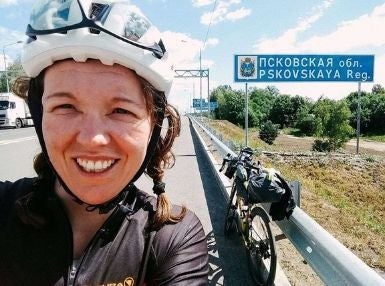
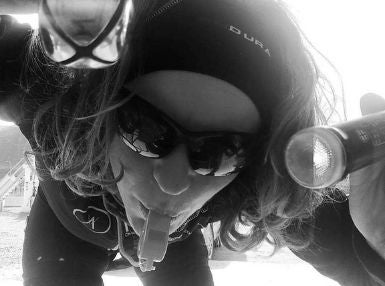
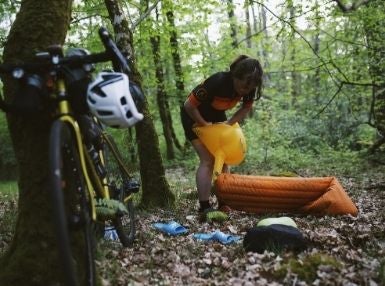
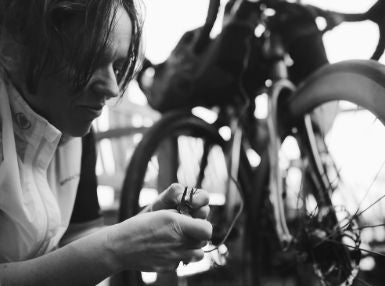
-120213.jpg)
